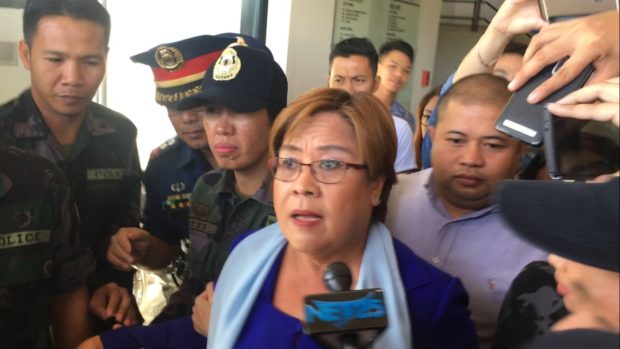
Senator Leila de Lima PHOTO BY ERMA EDERA/INQUIRER FILE PHOTO
Detained Sen. Leila de Lima has linked a Supreme Court justice to a convicted drug lord, who now serves as one of the government’s witnesses in the drug case filed against her.
Accusing the magistrate of “conflict of interest,” De Lima asked the high tribunal to order Associate Justice Presbitero Velasco Jr. to inhibit himself from deciding on her petition seeking the dismissal of her drug case and her release from detention.
Acquittal of drug lord
The senator cited an investigative news report that claimed Velasco initially pushed for the acquittal of convicted drug lord German Agojo when the Supreme Court division deliberated on the case in 2009.
Agojo was charged in 1999 and eventually found guilty of selling “shabu” (crystal meth) by the Batangas Regional Trial Court (RTC).
The Court of Appeals and then a Supreme Court division unanimously upheld the RTC’s decision.
‘Investigative report’
De Lima quoted part of the investigative report titled, “Shadow of Doubt: Probing the Supreme Court” by Maritess Vitug that claimed Velasco initially sided with Agojo and only agreed to join the majority after an “intense discussion” with another justice.
“Justice Presbitero J. Velasco Jr. is unfit to decide the case at bar due to conflict of interest,” De Lima said in a petition filed on Thursday.
“The conflict of interest stems from prior actuations in connection to German Agojo, a primary witness in the case,” she added.
Campaign contributor
Agojo was one of the New Bilibid Prison inmates who claimed he was ordered to contribute to De Lima’s 2016 senatorial campaign.
De Lima has been detained at the PNP Custodial Center since Feb. 24, when she was arrested based on a warrant issued by Muntinlupa City RTC Judge Juanita Guerrero.
Shortly after her arrest, De Lima asked the Supreme Court to overturn the move of the Department of Justice to charge her before the Muntinlupa court for allegedly benefiting from the Bilibid drug trade.
During the oral arguments before the high court last March, one of the main issues discussed was whether De Lima’s case fell under the jurisdiction of the RTC or the Sandiganbayan.
De Lima had argued that the complaint should have been investigated by the Office of the Ombudsman, and not by the DOJ.
She cited a Sandiganbayan rule that provided that government officials with a salary Grade 27 and above would be investigated by the Ombudsman.
The senator also argued that the allegations against her did not constitute the sale and trading of illegal drugs, but direct bribery.

